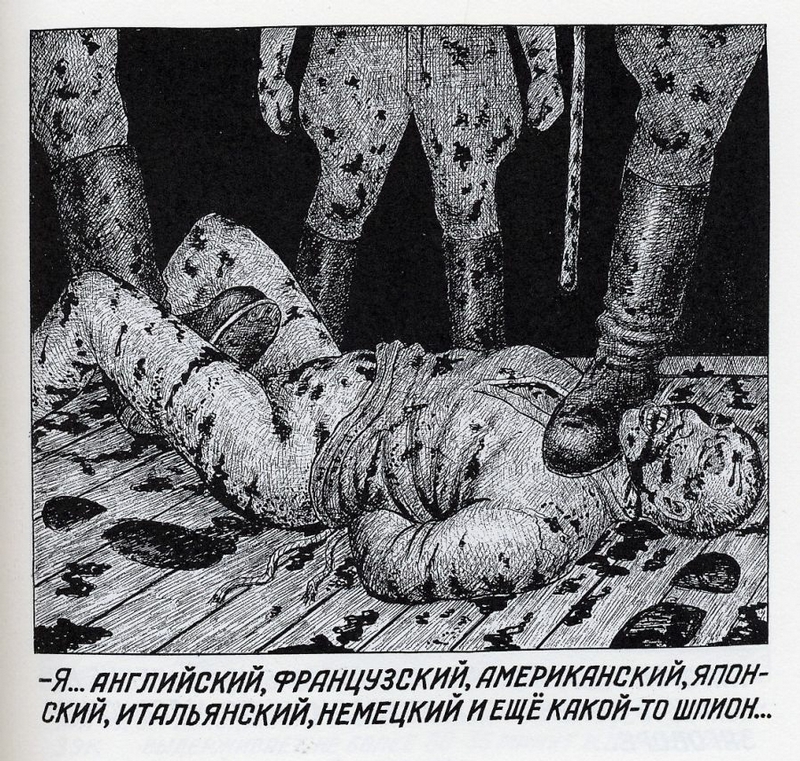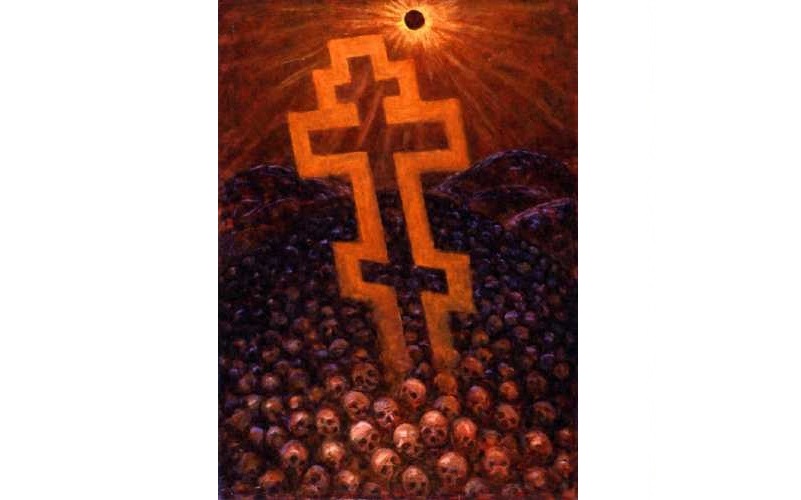Director Yuriy Luhovy and producer Zoryana Hrytsenko from Canada have rescued 26 video recordings of Ukrainian dissidents. These recordings are unique because they were created in the late 1970s and early 80s. The videos show Ukrainian dissidents who were released from Mordovian Gulags or were tortured, drugged, and abused in Soviet psychiatric hospitals.
Testimonies, interviews, and speeches of dissident leaders Petro Hryhorenko, Valentyn Moroz, Nadiya Svitlychna, and other Ukrainian political prisoners are available online, on Yuriy Luhovy’s YouTube channel.
Ukrainian dissident Valentyn Moroz arrives in Montreal
Summer of 1979. After 13 years of Gulags and a five-month hunger strike, Valentyn Moroz, legendary figure of the Ukrainian dissident movement, arrives in Montreal, Canada. Under pressure from the international community, Soviet authorities exchanged him and four other Ukrainian dissidents for two Soviet spies.
“Moscow shows benevolence only when it sees a truncheon in someone’s hands and realizes that it will be used. The West is still unable to understand this.” Moroz told journalists of leading Canadian publications.

Hundreds of Ukrainian-Canadians met the former political prisoner at the airport and loudly sang the Ukrainian anthem. After a few days of rest, Moroz spoke to a packed hall in Montreal.
“Moroz was given a standing ovation. 800 people applauded for ten minutes! It was such a tremendous emotional outburst! The building seemed to shake on its very foundations!” recalls Ukrainian-Canadian director and co-author of the first film about the Holodomor, co-initiator of the video restoration project, Yuriy Luhovy.

The meeting with Valentyn Moroz and many other Ukrainian dissidents who escaped or were forcibly expelled from the Soviet Union was filmed by Volodymyr Haiduk’s team, which was composed of student volunteers from the local Ukrainian community who understood that they were recording material of historical significance. Haiduk was a member of the Valentyn Moroz Defense Committee, which began defending all Ukrainian political prisoners.
“We knew how important it was to document their testimonies about Russification in Ukraine, about the suppression of human and national rights. All this information was firmly quashed in the USSR. So today, it’s very important to be able to see and hear how these courageous people spoke, what they said and share their emotions.” says Zoryana Hrytsenko, co-initiator of the video pre-restoration project.
Rescuing the video archives of the Ukrainian dissidents
In the 1990s, the films were transferred to the Ottawa Archives for storage. For more than 20 years, they remained in storage until the archivists asked Luhovy to take them back because there was not enough space for them.
“Otherwise, they would have been thrown out. We just had to save and restore them,” Luhovy recalls.
It was necessary to act quickly. The film was so unique that it was extremely difficult to digitize it, and it was covered with fungus. Luhovy managed to find an American company that undertook the restoration. The project was funded by different Ukrainian Diaspora organizations in Canada.

Today, Yuriy Luhovy is working on further restoration: colour correction, sound balance, editing. Zoryana Hrytsenko is searching for archival information and preparing biographical data that will accompany the restored recordings.
Zoryana Hrytsenko explains that every meeting, every testimony was very intense, very emotional. The recordings show how difficult it was for the dissidents to relate and relive these dramatic events. Yuriy Luhovy notes that their courage and dedication were remarkable. They were thrown into mental hospitals, tortured and beaten, but they never succumbed.

In one of the recordings, Viktor Borovsky, a young man with lush, brown hair, deeply inhales his cigarette, pauses and continues:
“The injections didn’t hurt. For the first few seconds I didn’t feel anything. But then, I felt disoriented... I understood almost everything they said, but my brain refused to obey. My body and mind were in another world. I was a prince lying on a big bed with many servants in bright white coats milling around me.”
At the age of 18, Viktor Borovsky, who was still a student in Kharkiv, was sent to a psychiatric hospital in Sloviansk, Ukraine for two months for criticizing the Soviet regime. He was systematically and forcibly pumped with psychotropic drugs.
“My mother came to visit me, but I couldn’t get excited about it. I lay there in a kind of delusive stupor, looking for something, trying to find my way. My mother and some people in white coats came in; I saw them, but there was nothing I could do about it. I couldn’t speak or react in any way.”

The role of the Ukrainian Diaspora
All over the world, the Ukrainian Diaspora raised awareness about the ongoing persecution and arrests of Ukrainian dissidents, drawing the attention of key world governments and the United Nations.
The Canadian Defense Committee for the Liberation of Valentyn Moroz organized major protests near Soviet institutions, petitioned members of the Canadian Parliament, disseminated information and organized hunger strikes.

The Committee also collected signatures of about two hundred Canadian scholars, scientists and cultural figures in defence of Moroz, and the Canadian government received thousands of telegrams and letters demanding the release of Ukrainian political prisoners. After a wave of protests, the Canadian government called on the Soviet authorities to release Moroz from prison.
“We knew it was working, because there were more and more protests coming from the Soviet Union!” recalls Yuriy Luhovy, who filmed every protest or meeting in Montreal.

The Committee contacted the most influential Canadian newspapers and media to attend the conferences and meetings with the Ukrainian dissidents. It was most important to disseminate this information beyond the Ukrainian hromada to the English and French-speaking communities and allow the Western press to communicate directly with the political prisoners. The Committee members organized the events and helped with the translations.


In 1976, the Committee sent a long telegram to the UN with 10,000 signatures protesting the use of punitive psychiatry by the Soviet Union against Valentyn Moroz. Under worldwide pressure, Soviet authorities declared Moroz healthy and released him in 1979. Shortly after Moroz was released, the Committee began defending other Ukrainian dissidents.

The Kremlin’s information war against the Ukrainian dissidents and Diaspora
Luhovy recalls that sometimes 200-300 people came out to demonstrate against the oppression of Ukrainian dissidents, but rarely was there any mention in Canadian publications or media. The Soviet Embassy worked very effectively, spreading misinformation about certain Diaspora figures, calling Ukrainians “fascists and traitors”.
Luhovy shows a series of photos of how a Soviet journalist staged a provocation against one of the leaders of the dissident movement, General Petro Hryhorenko.
“Everything Hryhorenko said at the meeting is a lie! There are no Gulags in the Soviet Union!” shouted the Soviet journalist.
This happened during a meeting of the Ukrainian dissident with the Canadian Minister of Foreign Affairs Flora MacDonald in Ottawa during the NATO summit.

In the mid-1970s, Hryhorenko helped found the Moscow Helsinki Group and the Ukrainian Helsinki Group, was arrested several times for his political activities and ultimately committed to a mental hospital. On December 20, 1977, the Soviet authorities allowed Hryhorenko to travel to the United States for medical treatment. His health was ruined during forcible confinement in KGB-run mental hospitals. He was stripped of his Soviet citizenship, and he never again returned to the Soviet Union.
Petro Hryhorenko died on February 21, 1987 in New York City.
The Soviet regime also infiltrated its agents into the Ukrainian Diaspora and attempted to divide the community. At that time, a Ukrainian pro-communist group was active in Canada.
“When the dissidents arrived to speak at conferences and meetings, part of the Ukrainian community refused to meet with them because they considered them ‘agents’. Nevertheless, the halls were packed everywhere they went… both in Canada and the States!” says Luhovy.

Incredibly strong people
Yuriy Luhovy and Zoryana Hrytsenko remain impressed by the strength and courage of the Ukrainian dissidents that they had the privilege of meeting.
“There are always people who want to seize other people’s territories. The [Soviet] government will change and others will come to power. That’s why we need to assert our rights and make our country strong! Our people must be united; they must have an army, so that when an aggressor appears, they can fight back and repel him!” loudly cried dissident Petro Hryhorenko at a meeting. These words were spoken about half a century ago... and remain more than relevant today!

Both researchers maintain that Ukrainian dissidents made a significant contribution to the collapse of the Soviet Union and Ukraine’s independence.
“What the dissidents said back then remains very relevant today. Ukraine is still fighting to preserve its rights and freedom. Russia has never stopped and will never stop. But, Ukraine will fight back and will survive!” says Zoryana Hrytsenko
Yuriy Luhovy has been working on the recordings for seven months, sometimes non-stop for ten hours a day. He has never regretted his involvement with the Ukrainian dissident movement and his decision to rescue the tapes.
The first restored recording with the participation of Ukrainian dissidents Valentyn Moroz and Viktor Borovsky have appeared on Yuriy Luhovy’s YouTube channel. Yuriy Luhovy and Zoryana Hrytsenko plan to publish the recordings with Petro Hryhorenko very soon, and many others somewhat later.
[embedyt] https://www.youtube.com/embed?listType=playlist&list=UUvZGrYiP-9C5VqgIss2Jz2g[/embedyt]





